THIS PAGE IS BEST VIEWED IN
LANDSCAPE MODE

WEDNESDAY, APRIL 24, 2024
NEW EMAIL: THESENIORLOG-USA@HOTMAIL.COM
.
“My philosophy is to live in the now.
Yesterday is gone, you don't know if
there's even going to be a tomorrow,
so you might as well enjoy today.”
Iris Apfel

AI could play role
in preventing prescribing
of unnecessary drugs
in older adults

BY KRISTEN FISCHER
A new study finds that artificial intelligence could encourage doctors to stop prescribing drugs that aren’t necessary — especially in older adults, who tend to be on multiple medications. The report was published Thursday in the Journal of Medical Systems.
More than 40% of older adults are taking five or more prescription medications, a rate that raises their risk for potentially harmful drug interactions.
Researchers used ChatGPT to assess a faux medication list for seniors. The team requested the AI technology to evaluate a variety of clinical scenarios when someone took different mixtures of medications. The scenarios included having a history of heart disease and having a difficult time performing activities of daily living.
The Signs of Depression
in Seniors

By Sam Thompson
What does depression looks like? Lack of interest, lethargy and sadness are all visible signs that we notice. Depression in seniors can manifest itself in different ways than it does in younger adults. Old age and disease can be attributed to many of the symptoms of depression in seniors. This can make it more difficult for both doctors and loved ones to realize when a senior is depressed.
What are the most common signs of depression in seniors? If untreated, depression in seniors can lead to:
Loss of concentration and other cognitive changes. These can quite easily be attributed to dementia or another illness such as Parkinson’s disease.
- Loss of pleasure in activities. This can show up as lethargy or a depressed mood.- Weight loss or weight gain. Along with this you will notice an increase or a decrease in appetite. Those with a loss of appetite will show no enjoyment in food. If they once loved to cook or think up new recipes, this too will gradually disappear.- Feelings of worthlessness. If your loved one is showing feelings of extreme guilty or worthlessness, it’s time for a trip to their healthcare provider. The same goes if they start to speak of wishing to die or commit suicide. This is a mental health emergency.
UNDERSTANDING
PRENUPTIAL AGREEMENTS
FOR SECOND MARRIAGES

BY BRIAN JOSLYN
Second marriages are often a second chance at love and tend to draw on the wisdom gained from prior experiences. There are plenty of reasons why couples choose to remarry after divorce or the loss of a spouse. Love and companionship remain the leading reasons people decide to get married. However, beyond love, there are practical considerations such as increased health, better finances, and lower poverty rates that often motivate individuals to remarry.
Those entering into a second marriage often bring valuable insights from their past relationships, allowing them to navigate potential pitfalls more proficiently. By reflecting on past mistakes and understanding their own needs and boundaries more adequately, spouses can actively work towards building a stronger and more fulfilling partnership the second time around.
Many times, those who choose to marry for a second time opt to prepare a prenuptial agreement, which is a practical tool that clarifies financial matters and protects assets. Prenuptial agreements also serve as a means for couples to communicate openly about expectations and responsibilities. They foster transparency and trust, contributing to the overall stability and longevity of the marriage.
Study shows strong social ties
may ease the way for older adults
in life's final chapter
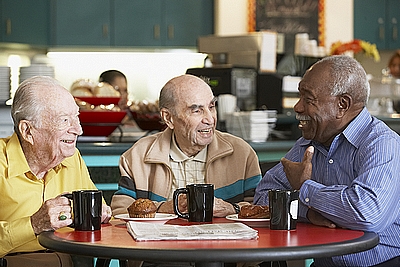
By Vijay Kumar Malesu
In a recent study published in The Lancet Healthy Longevity, a group of researchers investigated the changes in and impact of social connections on end-of-life outcomes, including symptoms, healthcare utilization, and place of death in older adults across 19 countries using longitudinal data.
Study: Social connection and end-of-life outcomes among older people in 19 countries: a population-based longitudinal study. Image Credit: belushi / ShutterstockStudy: Social connection and end-of-life outcomes among older people in 19 countries: a population-based longitudinal study. Image Credit: belushi / Shutterstock
Background
The significance of social connections on health, particularly in the final stages of life, remains underexplored despite evidence suggesting its comparable impact on mortality to well-established risk factors. With aging populations facing increasing chronic illness, understanding the dynamic nature of social ties and their influence on end-of-life experiences, including symptoms, healthcare usage, and death's location, becomes crucial. Further research is needed to establish causal relationships and identify mechanisms by which social connections influence end-of-life outcomes, potentially guiding targeted interventions and policy development.
What is independent
senior living?
Experts break down
pros and cons
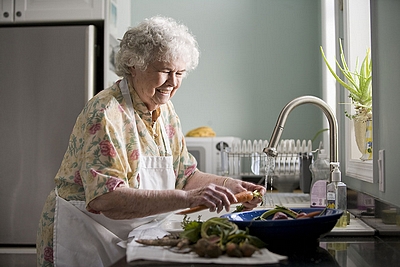
By Nicole Fabian-Weber
There are a number of living options for older adults, one being independent senior living. Geared toward older adults that are — you guessed it — independent, these communities provide things like socialization, outings, fitness classes and more. Needless to say, they’re incredibly beneficial for senior well-being.
“In many cases, independent living communities allow seniors to live on their own without the burden of cooking, housekeeping or home repairs,” explains Benjamin Surmi, a social gerontologist and director of education and culture at Koelsch Communities, a senior living company with independent living, assisted living and memory care.
“Furthermore,” he continues, “independent living provides access to amenities, resources, services and other benefits.”
Whether you’re looking for yourself or a loved one, here’s everything to know about independent senior living.
In Other News....
Are You Taking
Too Much of This
Common Pain Reliever?
With the ingredient present
in more than 600 drugs,
it's easy to overdo it
By Kimberly Goad
You wouldn’t knowingly exceed the dosage on a pain reliever. But if you regularly reach for a common analgesic to treat any one of a number of ailments — whether it’s arthritis or back pain, the flu or seasonal allergies — you might inadvertently be doing just that.
Acetaminophen (a.k.a. Tylenol) isn’t merely a standalone remedy for, say, the occasional headache, back pain or muscle aches; it’s also commonly included in medications that treat the above health woes and others. According to the U.S. Food & Drug Administration (FDA), more than 600 drugs — both prescription and over the counter — contain acetaminophen to help curb pain and reduce fever.
And while it’s easy to assume that anything sold off the shelf at your local pharmacy lacks the power to do serious harm, the truth is “just because it’s over the counter doesn’t mean it’s a safe medicine,” says Mohammed Issa, M.D., assistant professor at Harvard Medical School and medical director of the Pain Management Center at Brigham and Women’s Faulkner Hospital. “Too little or too much of anything can be dangerous — even an over-the-counter medicine like acetaminophen.”
==================
Smart Ways to Help
Your Adult Children's
Financial Lives
Start by familiarizing them
with financial concepts,
By Lucy Lazarony
Joanne Burke is a Certified Financial Planner in Vienna, Virginia, and a mom with two 20-something adult children. She is helping them by planning and investing for their futures.
"The way I help my kids is to fund their Roth IRAs," says Burke, founder of Birch Street Financial Advisors. "The Roth accounts are incredibly flexible and have the capacity to grow into a sizable account over the course of their lifetime. This is the legacy that I'm leaving for them."
"Instead of them inheriting my wealth when they're in their 50s or 60s and in the highest earning potential and tax brackets, I'm giving it to them now. The compounding feature in a tax-free account is unparalleled," she says.

Yes. It is a Witch Hunt

It might come as a shock, but I agree with our ex-president's statement that "This is a witch hunt." Yet, unlike the witch trials in 17th century Salem, this witch hunt is not based on baseless accusations or fear-mongering, but on concrete evidence of dark magic being used to manipulate and sway others to do evil. It is a necessary and justified pursuit to protect the innocent and uphold justice in our society.
While some may scoff at the idea of witches and magic in the modern world, the evidence of their existence is undeniable. The ex-president's statement may have been met with skepticism and ridicule, but those who have witnessed the effects of this witch's spells and curses know the truth of the matter.
In a world where the line between reality and fantasy is often blurred, it is important to recognize and confront the presence of evil in whatever form it may take. This witch hunt may be unconventional, but it is a crucial step in ensuring the safety and well-being of our nation.
So, while the comparison to the Salem witch trials may seem far-fetched, the reality of this modern-day hunt for a witch is all too real. It is a reminder that evil exists in many forms, and it is up to us to stand up against it, no matter how unconventional the means may be…….


What to know about
home care services
for older people

By Reed Abelson
Most older Americans want to live at home as long as they can, but finding and affording the help they need often isn’t easy. There are severe shortages of home health aides in many parts of the country. Hiring them is costly. And most middle-class people will have to pay for home care themselves if it’s needed for the long haul. Here’s a guide to locating home care for an older person.
What kind of home care do you need?
My life in a
tiny-home
community
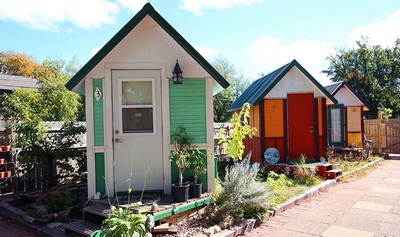
By Nadine Green
I live in an eight-by-10-foot house at A Better Tent City Waterloo Region, a community of tiny homes in Kitchener, Ontario. I’m the site coordinator, which means I’m responsible for the well-being of the community—I work, and live, alongside the residents. My duties include daily check-ins with residents, connecting them with supports, mediating disputes, fostering partnerships and any other tasks that pop up. I’ve been living and working here since the community was founded in 2020, and I plan to live here for as long as it takes for residents to find permanent housing.
I sleep soundly, unbothered by the speeding cars that whirl down Highway 7. The lock on my door is one of my tiny luxuries. When I wake up, the smell of coffee and freshly cooked bacon from the nearby common space waft through the air. I open my eyes to the smallest amount of light peeking through my small window, and immediate gratitude washes over me.
I moved from Jamaica to Canada nearly 40 years ago, when I was 16. My parents divorced, and I had to go with my mother and her new husband to Cambridge, Ontario, leaving my father behind. I didn’t want to leave my home, the salty air and the year-round sun,
This Is How Much
You Should Budget
to Live in a 55 and
Older Community

By Geoff Williams
Many people like the idea of living in a retirement community – particularly one aimed at adults 55 and older that offers amenities such as fitness centers, swimming pools and cooking classes. These communities often resemble country clubs more than senior living. Oftentimes, however, this lifestyle comes at a steep cost.
“Most people way, way underestimate the costs of needs and long-term care during retirement,” says Thomas Mitchell, a certified financial planner and the senior vice president at OneAZ Wealth Management in Phoenix.
So how much should you budget to live in a 55-and-older retirement community? Here’s a look at what these communities include and the costs to expect.
A boomer couple
left Texas
for the retirement
of their dreams:
'We were brainwashed
that it was
the only place to be
— it's not'

By Alcynna Lloyd
Nancy and Jim Cotton, both lifelong Texans, moved to a small town in northern Georgia in 2022.
The couple was tired of paying high property taxes and wanted a new adventure in retirement.
In Georgia, they have a bigger property at a lower cost and save up to $3,000 monthly.
This as-told-to essay is based on a conversation with Nancy, 60, and Jim Cotton, 66, who moved to a remote town near Ellijay, Georgia, in 2022 after decades of living in Texas. The essay, which also incorporates quotes from emails between the Cottons and BI, has been edited for length and clarity.
Nancy: I lived in Texas from the age of 16 until I was about 59 — so most of my adult life.
Jim: I grew up in Texas and lived there all but three years.
Nancy: There's something very mythical about living in Texas. You just can't imagine living somewhere else. Although we liked living there very much, there wasn't anything in the state that we hadn't done four or five times. Trying something different was definitely appealing.
Researchers find a way
to predict which of our
organs will fail first
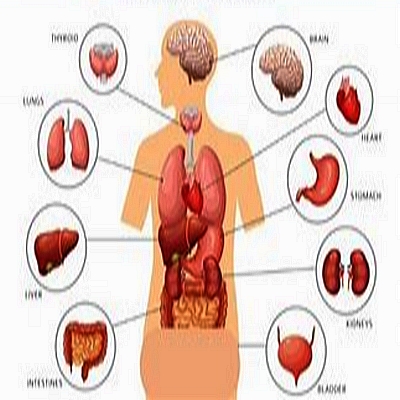
Like any typical car or house or society, the pace at which parts of our bodies fall apart varies from part to part. A study of 5,678 people, led by Stanford Medicine investigators, has shown that our organs age at different rates—and when an organ's age is especially advanced in comparison with its counterpart in other people of the same age, the person carrying it is at heightened risk both for diseases associated with that organ and for dying.
According to the study, about one in every five reasonably healthy adults 50 or older is walking around with at least one organ aging at a strongly accelerated rate.
The silver lining: It may be possible that a simple blood test can tell which, if any, organs in a person's body are aging rapidly, guiding therapeutic interventions well before clinical symptoms manifest.

Centenarian Facts
1.Centenarians are individuals who have reached the age of 100 years or older.
2.It is estimated that there are currently around 450,000 centenarians worldwide, with that number expected to increase significantly in the coming decades.
3.Centenarians often lead active lifestyles, with many attributing their longevity to factors such as diet, exercise, and social interaction.
4.Studies have shown that centenarians tend to have a lower prevalence of chronic diseases such as heart disease, cancer, and dementia compared to younger age groups.
5.Genetics also play a role in determining whether someone will live to be a centenarian, with some individuals inheriting genes that predispose them to longevity.
6.Centenarians often have a positive outlook on life, with many citing a sense of purpose, resilience, and adaptability as key factors in their ability to live to such an advanced age.
7.Many centenarians enjoy strong social connections, whether with family members, friends, or members of their community.
8.Centenarians often have unique perspectives on life, having lived through significant historical events and societal changes.
9.Studies have shown that centenarians tend to have higher levels of emotional well-being and life satisfaction compared to younger age groups.
10. Centenarians are a source of inspiration for people of all ages, demonstrating that it is possible to live a long and fulfilling life well into old age.

NEXT EDITION
FRIDA, APRIL 26, 2024

©2024 Bruce Cooper


-30-
*************
THIS PAGE IS BEST VIEWED IN
LANDSCAPE MODE

MONDAY, APRIL 22, 2024


NEW EMAIL: THESENIORLOG-USA@HOTMAIL.COM
.
“I suppose I am remembering Passover
as a way to remind myself that the struggle
for freedom is as old as time.
That there are always others who
yet need to be delivered.”
― Jonathan Auxier,

Baby boomers
are hitting "peak 65."
Two-thirds don't
have nearly enough
saved for retirement.

By Aimee Picchi
The nation is rapidly approaching "peak 65" as younger baby boomers turn 65 this year, initiating the biggest wave of retirements in U.S. history. Yet most of those Americans are financially unprepared to stop working, and many risk living in poverty, according to a new analysis.
The retirements of the youngest boomers — those born between 1959 and 1965 — are likely to reshape the U.S. economy, and not in entirely positive ways, according to the study from the ALI Retirement Income Institute, a non-profit focused on retirement education.
The new research underscores the impact that income and wealth inequality has had on a generation that, at least on aggregate, is the nation's wealthiest. Boomers who are White, male or have college degrees are the most likely to be financially prepared for retirement, but many people of color, women and those with only high school educations are lagging, the study found.
Routine jobs
raise the risk
of cognitive decline
by 66%
and dementia by 37%

By Sandee LaMotte
Working your brain hard at your job could pay off in more ways than boosting your career — it may also protect your cognition and help prevent dementia as you age, a new study found.
Having a routine job with little mental stimulation during your 30s, 40s, 50s and 60s was linked to a 66% higher risk of mild cognitive impairment and a 37% greater risk of dementia after the age of 70, according to the study, when compared with having a job with high cognitive and interpersonal demands.
How to fight dementia, according to neurologists...
‘Aging in Place,
or Stuck in Place?’

By Paula Span
When it came to housing, Susan Apel and Keith Irwin thought they had planned adroitly for later life. They bought a four-bedroom house on two acres in Lebanon, N.H., 24 years ago, and “we made sure to pay off the mortgage before we retired,” said Ms. Apel, 71.
That way, the home equity they had built up — they estimate their house is now worth about $700,000 — would allow them to sell and downsize into smaller, more manageable quarters when they needed them.
That time has arrived. Ms. Apel, a retired law professor, is having trouble climbing stairs. Mr. Irwin, 71, previously an account manager for a local business, is wearying of yard work and snow shoveling, and finding workers to do those chores instead has become difficult.
(Download and save to "Pocket.com" extension if NYT locks you out)
Research highlights
urgent need
to address
cancer inequities
in older adults

A systemic review of the current body of research shows that investigators have inadequately addressed the intersection of aging, health disparities, and cancer outcomes among older adults. This is the conclusion of a new paper published in the Journal of the American Geriatrics Society, and led by Nikesha Gilmore, PhD, a member of Wilmot Cancer Institute at the University of Rochester.
As the population of survivors of cancer 65 and older will likely double in size during the next two decades, the review reveals an urgent need for research to address biases impacting cancer outcomes in older people.
A lack of studies focused on disparities, as well as policies and targeted interventions to improve health equity, "perpetuates cancer inequities and leaves the cancer care system ill-equipped to address the unique needs of the rapidly growing and increasingly diverse older adult cancer population," the team concluded.
Social Security Update
Expands Benefits Nationwide

By Aliss Higham
Some Social Security recipients nationwide may soon get more money in their pockets after a change to eligibility criteria, the Social Security Administration (SSA) has announced.
The government agency has announced it is expanding its rental subsidy policy for those who claim Supplemental Security Income (SSI) payments. Under the new rule, published last week, rental assistance, such as renting at a discounted rate, will become less likely to affect a person's SSI eligibility or payment amount.
SSI gives monthly payments to adults and children with a disability or blindness, as well as to adults aged 65 and older who have limited income and resources. Often, these payments are intended to boost the income of those who claim Old-Age, Survivors, and Disability Insurance (OASDI) payments that may fall short of providing for basic needs. In January 2023, 7.4 million individuals received monthly SSI payments averaging $654, according to an SSA report.

Hobby-Based Side Gigs:
How Seniors
Can Generate
Extra Income

By Sarah Li Cain
Retirement seems like the best time to ramp up or start pursuing those hobbies you’ve always wanted to make time for. The perk is that many hobbies can also make you money — and that extra money can go towards a nice vacation or a nice little treat.
Monetizing a hobby may not be as difficult as it seems and can be another way to add more purpose to your days. Take a look at this list of hobby-based side gigs where you can earn some extra income, as inspired by Knowadays.
1. Crafts
The global arts and craft supplies market was worth over $44 billion as of 2023, per Research and Markets. While the craft supply side of this equation doesn’t mean all of those products sell, the amount of successful vendors on Etsy or similar marketplaces indicates there’s a vibrant consumer base for quality finished product. You can certainly tap into this market by selling your crafts on marketplaces like eBay or Etsy, or at your local farmers and crafts markets.


Lively is a smartphone service designed for seniors, offering a user-friendly interface and a budget-friendly price of under $30 per month. While they do charge 10 cents per text, downloading the "Watsapp" app allows for free texting. Lively caters to those who prefer simplicity, focusing on basic phone functions and internet access. However, when they push for additional features without considering user preferences, it raises questions about their true commitment to being "senior-friendly." Here’s the offer:
Dear Bruce,We are excited to announce upcoming changes to our data plans that we believe will better align with your needs. Based on evolving customer data usage habits, our $2.49/month data plan is being retired, and your account will move to a 1GB data plan for $5/month. This means you’ll get a lot more data for only $2.51 more per month, which you can use for video calls, shopping, gaming, or streaming. The updated plan will also help reduce your risk of data overage charges.You will continue to pay $2.49/month for your current data plan until your billing date in June when you will move to the 1GB plan and $5/month price.Sincerely,Your Lively Team
This unneeded and unwanted increase prompted me to write this open letter…
Dear Lively,I wanted to take a moment to express my thoughts and concerns regarding the recent email I received from your company. As a new customer, I was initially impressed with the services you offered, as they aligned perfectly with my needs and preferences. However, I was disappointed to learn that I am now required to purchase additional data storage for a small fee.When I made the decision to switch my cell phone service provider, it was primarily due to the high cost and unnecessary charges I was experiencing with my previous provider. I was seeking a more affordable option that would cater to my specific requirements. Your service seemed to tick all the boxes, offering a phone within my budget and eliminating charges for services I neither used nor required.As a senior, simplicity and choice are of utmost importance to me. I do not store photos or require excessive data space, as I have a laptop for those purposes. Furthermore, I do not download every free app available on my phone. I value the ability to choose what features I need, rather than being compelled to accept certain ones. This is why I was initially drawn to your service, as it allowed me to customize my plan to fit my needs.Therefore, receiving an email stating that I am required to purchase additional data storage was disheartening. If I had wanted that much storage, I would not have switched services in the first place. I believe it is crucial for your company to recognize that individuals like myself, who are seniors, value simplicity and the ability to choose what we need.In light of this, I kindly request that all future upgrades, including the one mentioned in your email, be made optional. By allowing us to decide for ourselves what features are necessary, you will not only cater to our specific needs but also ensure customer satisfaction.Thank you for taking the time to read my concerns. I hope you will consider my request and continue to provide a service that values simplicity and choice.Sincerely,Bruce Cooper

Many not planning well
for life expectancy, study finds

By Rayne Morgan
A new study by Jackson Financial Inc. and Boston College suggests that most seniors are not as concerned about longevity risk – i.e., outliving retirement resources – as they should be, as most are not accurately predicting their lifespan.
Longevity risk refers to the chance that life expectancies and actual survival rates exceed expectations or pricing assumptions, resulting in greater-than-anticipated cash flow needs on the part of insurance companies or pension funds.
“People do not accurately estimate their life expectancy when comparing their expected longevity to standard mortality tables,” Glen Franklin, assistant vice president of Research and RIA & Lead Generation Strategy at Jackson, said.
“Most overestimate their life expectancy, and increase the risk of not effectively planning for late life events such as long-term care.
Treating Geriatric Sports Injury
Among Pickleball Players:
A Narrative Review of an
Exercise Craze Among Seniors

By Joseph Pergolizzi Jr. • Jeri Matera • Jo Ann K. LeQuang
The sudden and enormous popularity of pickleball has included a surprising and large contingent of geriatric players. Similar to tennis and badminton, pickleball is a game with a short learning curve that offers low-impact cardiovascular benefits. Unlike tennis, most injuries in pickleball are sustained by older rather than younger players. In fact, pickleball-related injuries increase with increasing age. Such injuries include strains, sprains, joint pain, falls, and fractures. The most affected joints are the wrists, shoulders, knees, and ankles. Clinicians can advise their older pickleball patients on strategies and tips to minimize the risk of injury. This may be particularly important because many older individuals playing pickleball today were previously sedentary. Older people may be attracted to pickleball because it is an inclusive sport with a high socialization factor. Nevertheless, pickleball can deliver an excellent cardiovascular workout and it may be an example of a successful way to promote exercise among older people and those who resist exercise.
Introduction & Background
Pickleball is a popular American sport derived from elements of tennis and table tennis. It is played based approximately on the rules of badminton. The competitors play on a hard-surfaced court approximately 20 x 44 feet (6 x 13.4 meters), and the object is to volley a Wiffle ball back and forth over the net. With large paddles, underhand service, a non-volley zone on either side of the net, and a ball with a relatively predictable bounce, pickleball is easy for novices and older people to play, although young, fit, and very athletic players compete in fast-paced, challenging games . In fact, the game was designed to discourage high-speed play and allow for all ages and abilities to participate. The rapidly growing popularity of pickleball among seniors, even those who previously had been sedentary, has given the older population new recreational opportunities, while at the same time, presenting clinicians with geriatric sports injuries. Older players are the largest group of pickleball fans and also the most likely to be injured
Most Americans
Are Quitting Smoking
—Except For Those Over 65

BY HALEY WEISS
An endless supply of trendy takes in recent years claim that among young adults, smoking is cool again. But though they may be hanging from the lips of major influencers and starlets, cigarettes have far more fans in an older demographic, according to new data on adult smoking behaviors in the United States. From 2011 to 2022, the prevalence of smoking habits decreased in every age bracket except one: the 65-and-up crowd.
Public health campaigns and programs outlining the dangers of smoking aren’t really aimed at older adults, says Rafael Meza, an integrative oncologist at the BC Cancer Research Institute in Vancouver and the lead author of a new study on adult smoking. “In the U.S., smoking really has a generational pattern,” he says.
Meza’s new analysis, published Dec. 1 in JAMA Health Forum, shows that while people ages 40 through 64 smoke the most, Americans 65 and above are picking up the habit in a way nobody else is. While the prevalence of regular smokers dropped to 15.2% down from 21.2% in a little over a decade for that middle-aged group, older adults saw an increase from 8.7% to 9.4% in the same time frame.
Best Card Games
for Older Adults

By Gail Willowby
Maintaining healthy brain function becomes more important as we age. We want to stay in shape physically but keeping our smarts is just as important. One way to do this is by playing cards. Always popular and lots of fun, there are many card games available that older adults enjoy.
Card Games
Solitaire. Also known as Patience, playing solitaire is one of the most loved card games. Solitaire can be played with a deck of cards or online. There are a multitude of different versions of Solitaire that can be played online – with Solitaired having many of them. All require skill and concentration. Many older adults who are disabled or chronically ill find that playing Solitaire is one way to keep their minds on the present and not on their illness or pain.
Inside America's senior care crisis:
Number of older citizens set
to balloon to 80.8 MILLION by 2040 -
yet just one in eight can afford
long-term care costing $11k a month
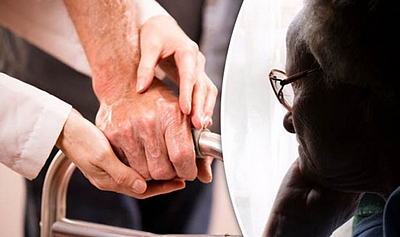
By HELENA KELLY
America is on the verge of a senior care crisis as nearly 70 percent of older adults will require long-term support at some point in their lives, a new report warns.
Experts say long-term medical care - which can cost up to $10,830 a month - is 'out of reach' to the majority of Americans. Only 13 percent of over 75s in major US metros able to afford assisted living without diving into their assets.
The findings, from Harvard's Joint Center for Housing Studies, lay bare the scale of economic emergency facing the nation's most vulnerable.

PASSOVER FACTS
1. Passover is one of the oldest known Jewish holidays, dating back over 3,000 years.
2. The holiday marks the Israelites' escape from slavery in Egypt, as outlined in the biblical Book of Exodus.
3. The name "Passover" comes from the Hebrew word "Pesach," which means "to pass over" or "to spare."
4. During Passover, Jews avoid eating leavened bread, known as chametz, to commemorate the Israelites' hurried departure from Egypt, where they did not have time to let their bread rise.
5. The tradition of holding a Passover Seder – a festive meal that includes the retelling of the story of the Exodus – dates back to ancient times.
6. Passover is celebrated for seven or eight days, depending on the tradition and location of the observance.
7. The four cups of wine consumed during the Seder represent the four promises that God made to the Israelites: "I will bring you out," "I will deliver you," "I will redeem you," and "I will take you to be my people."
8. The Seder plate includes symbolic foods such as matzah, bitter herbs, and a roasted egg, each representing different elements of the Passover story.
9. The tradition of hiding and finding the afikomen – a piece of matzah broken and wrapped during the Seder – is still practiced by many families as a way to keep children engaged and excited about the holiday.
10. Passover is considered a time of renewal and rebirth, symbolizing the transition from slavery to freedom and the possibility of a brighter future.
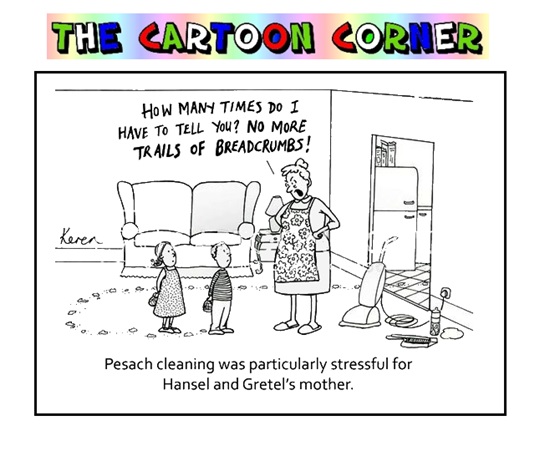
NEXT EDITION
WEDNESDAY, APRIL 24, 2024

©2024 Bruce Cooper

-30-
*************
THIS PAGE IS BEST VIEWED IN
LANDSCAPE MODE

FRIDAY APRIL 19, 2024
NEW EMAIL: THESENIORLOG-USA@HOTMAIL.COM
.
“Waiting for inspiration is like standing
at the airport waiting for a train.”
Leigh Michaels

Joe Biden's Top Economic Advisor
Has a Harsh but Realistic Solution
to Social Security's
Growing Cash Shortfall

By Sean Williams
KEY POINTS
- America's top retirement program is facing a funding-obligation shortfall of more than $22 trillion through 2097.
In an op-ed piece, former Fed Chair Janet Yellen suggested a dual approach to resolve Social Security's funding shortfall, which includes adjustments to spending.
- A bipartisan solution would greatly improve Social Security's long-term financial outlook.
Janet Yellen's approach to strengthen Social Security would directly clash with President Biden's proposal.
For most retired Americans, Social Security income is something they couldn't live without. Over two decades of annual surveys from national pollster Gallup have shown that 80% to 90% of then-current retirees rely on their monthly benefit, in some capacity, to cover their expenses. Furthermore, 76% to 88% of non-retirees expect to lean on their payout to offset at least some portion of their retirement costs.
Ensuring the health of America's top retirement program should be at or near the top of the list for lawmakers on Capitol Hill. Yet reports show that Social Security's financial health is worsening.
Number of homeless
senior citizens on the rise
in Florida, across the country
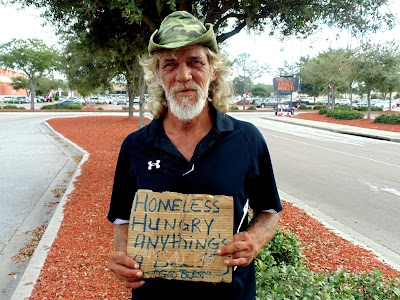
By Nicole Griffin
As baby boomers get older and inflation continues to rise, homes are becoming less and less affordable, and experts say that combination is leading to more senior citizens becoming homeless.
What You Need To Know
Nearly one in four homeless adults are over the age of 55
Homelessness among seniors is estimated to triple by 2030
Nearly a third of senior households are considered cost burdened, spending more than 30% of their income on housing.
According to the National Alliance to End Homelessness, nearly one in four homeless adults is over the age of 55.
Adults are aging faster,
facing higher risk of cancer
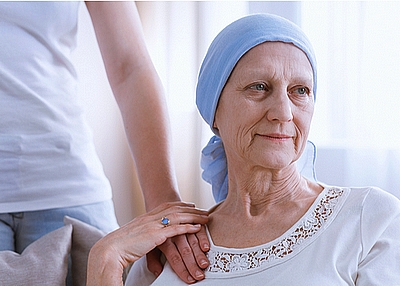
By Dennis Thompson
Younger generations are aging more rapidly, and this could be leading to an increased risk of cancer, a new study says.
People born in or after 1965 are 17% more likely to be experiencing accelerated aging compared to seniors born between 1950 and 1954, researchers found.
That faster aging is associated with a higher risk of certain cancers among adults younger than 55, also known as early-onset cancers, results show.
"Multiple cancer types are becoming increasingly common among younger adults in the United States and globally," researcher Ruiyi Tian, a doctoral student at Washington University School of Medicine in St. Louis, said in a news release. "Understanding the factors driving this increase will be key to improve the prevention or early detection of cancers in younger and future generations."
Best internet plans for seniors:
Compare discounts and deals

By Lisa Iscrupe & Hannah Whatley
Seniors on low, fixed incomes need internet access for many things, from telehealth appointments and entertainment to keeping in touch with family and friends. In some areas of the country, internet prices are higher than average, making it difficult for seniors on a fixed income to afford home Wi-Fi. Read on to learn more in this internet discount guide for seniors and find low-cost internet for seniors here.
Internet companies with senior discounts
Several companies and government programs offer senior discount internet deals for older adults. Internet service providers (ISPs) like Spectrum, Xfinity and Verizon have plans for qualifying low-income households that can help seniors reduce their internet bills.
Here, we’ll break down the best providers and plans that offer affordable internet for senior citizens.
The best internet for seniors....
Speech Problems
in the Elderly:
Medical Reasons,
Treatment, and More
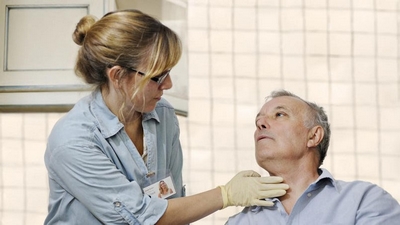
By Ishani Dhar Chowdhury
Being old is not only about gaining wisdom. It’s about dealing with the negative effects of aging. For instance, seniors can have difficulty with their physical health and mental capabilities.
One underrated thing caregivers can come across is speech problems associated with age. A 2023 report suggests that 18.79% of seniors had voice disorders.
With age, people lose their ability to communicate and speak effectively. While this is a normal aging process, it can be scary for caregivers to see their loved ones slowly deteriorate. Underlying medical conditions can also lead to speech and language problems.
In Other News....
How Lower Interest Rates
Could Affect Older Adults
When the Fed starts cutting interest rates, retirees could see lower yields on fixed-income assets. Social Security’s finances could be impacted, too.
BY PATRICK M. SIMASKO, J.D.
It’s been four years since COVID-19 reared its ugly head, yet we’re still dealing with the damage it left behind. Since its start in 2020, the pandemic has thrown our economy into a frenzy, forcing the federal government to try to prevent a recession while combating inflation. .......

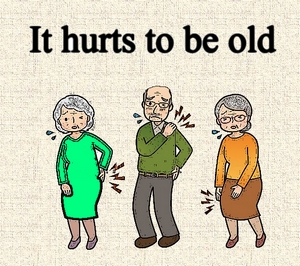
I have to admit, I wasn't ready for the challenges that come with old age. I anticipated certain changes, like not being able to do the activities I enjoyed in my youth, such as long walks, hiking, and sports. I also expected the occasional ache that comes with aging. However, what caught me off guard was the constant and persistent pain that I experience every single day. It's not just the typical arthritis twinges or occasional back or neck pain from a wrong move. It's not even the specific pain from injuries like broken bones, dislocated shoulders, falls, or illnesses like cancer. What many of us in our seventies and eighties deal with is an ongoing, vague, and relentless pain that never seems to go away.
This pain is not localized to one area of the body, but rather seems to permeate every joint, muscle, and bone. It's a deep ache that lingers, making even the simplest tasks feel like a monumental effort. It's a constant reminder of the toll that time has taken on my body.
I find myself longing for the days when I could move freely, without the constant reminder of my limitations. The joy of taking a leisurely stroll through the park or going on a challenging hike now feels like a distant memory. Instead, I am left with the frustration of having to rely on assistive devices just to get around.

But it's not just the physical challenges that come with old age that catch me off guard. It's the emotional toll as well. The realization that my body is no longer capable of doing the things it once could is a difficult pill to swallow. It's a reminder that I am no longer the person I once was, and that can be a hard truth to accept.
I have to constantly remind myself to be patient and kind to myself. To not get discouraged by the limitations that old age has placed upon me. It's a daily battle to find the strength to keep going, to not let the pain define me.
But amidst the challenges, there are moments of gratitude. Moments when I am able to find joy in the simple pleasures of life. Whether it's a warm cup of tea, a good book, or the company of loved ones, these moments remind me that there is still beauty to be found in this stage of life.
So, while I may not have been fully prepared for the challenges that come with old age, I am learning to adapt and find new ways to navigate this journey. I am learning to find strength in the face of pain and to appreciate the small victories along the way. And most importantly, I am learning to embrace the wisdom and resilience that comes with age. And for those youngsters reading this, I beg you. Be kind to that old man or lady in front of you at the checkout counter or the bank who may not be fast enough for you. Or those seniors that may appear grumpy or annoyed. Believe me, we don’t want to be that way. It’s just the pain taking over…..


Aging America faces
a senior care crisis
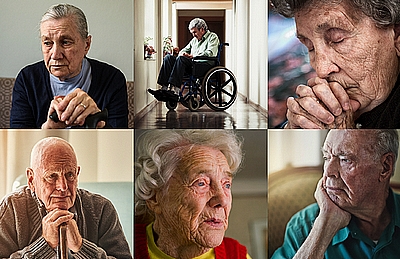
By April Rubin and Erica Pandey
As America's population of seniors grows, affordable long-term care is increasingly hard to find.
Why it matters: Nearly 70% of older adults will need long-term care services, according to Harvard's Joint Center for Housing Studies.
Medicare doesn't cover these services, and Medicaid often has long wait lists for at-home support, said Samara Scheckler, a research associate.
"The cost of daily assistance at home is out of reach for most," Scheckler said, "and so is assisted living, which bundles housing and care together."
By the numbers: 13% of adults 75+ in U.S. metro areas living alone can afford assisted living without diving into assets, per the Center.
Don’t Let Social Security’s
Dirty Little Secret Ruin You
And How to Survive Despite It

By Louis Navellier
I love Star Trek. It’s one of my geeky little vices.
And one of my favorite episodes of Star Trek: The Next Generation, “Half a Life,” has an interesting take on how to mitigate the effects of an aging population.
On the planet Kaelon II, when a person reaches the age of 60, they undertake “the Resolution.” In a gathering of family and closest friends, they attend their own funeral… and then commit ritual suicide so as to avoid becoming a burden to younger generations.
I got to thinking about that ST:TNG episode recently while considering the loss of some great men this week. Charlie Munger passed away at age 99 years and 332 days. Henry Kissinger died at age 100. And a week earlier, we lost a great woman: Rosalynn Carter. She was 96 years old. Her surviving husband, President Jimmy Carter, is 99.
Personalized health
and lifestyle changes
can delay memory loss
in older adults
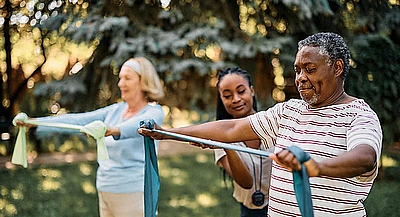
Study shows cognitive improvements when participants keep active and socially engaged, control blood pressure and diabetes.
As more medications move towards federal approval for Alzheimer's disease, a new study led by researchers at UC San Francisco and Kaiser Permanente Washington has found that personalized health and lifestyle changes can delay or even prevent memory loss for higher-risk older adults.
The two-year study compared cognitive scores, risk factors and quality of life among 172 participants, of whom half had received personalized coaching to improve their health and lifestyle in areas believed to raise the risk of Alzheimer's, such as uncontrolled diabetes and physical inactivity. These participants were found to experience a modest boost in cognitive testing, amounting to a 74% improvement over the non-intervention group.
Check in on your
grandparents:
Maine nursing home
treatment
is inhumane
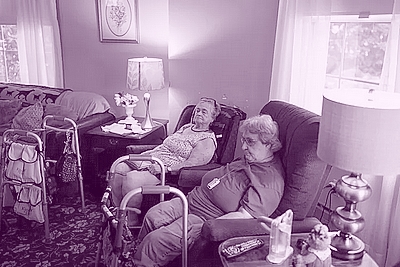
BY VINCENT NORMAN
Maine is the oldest state in the nation, and it’s getting older. For many adults, level IV nursing homes (long-term care facilities licensed for seven or more beds) are somewhere they believe their aging parents and relatives who have high levels of daily needs or serious health issues will receive better care. However, at nursing homes in Maine, your loved one may face physical abuse and neglect with limited to no accountability from the state.
Neglect and abuse is an issue that is sadly often gone unnoticed and unaddressed. From 2020 to 2022, there were 348 cases of abuse/neglect incidents at moderate levels of assistance nursing homes in Maine. The Department of Health and Human Services took no action in a staggering 91% of these cases.
Where is the empathy for this group of people? Older individuals deserve the fundamental right to humane treatment. They deserve justice for experiencing substantial abuse and neglect while receiving care they are paying for. Elderly people with higher needs deserve to be safe, cared for and happy.
UCLA studies unravel
metabolic pathways in
prostate cancer treatment

Two new studies led by researchers from the UCLA Jonsson Comprehensive Cancer Center give insight into how cells use energy to influence the way prostate tumors survive and grow -; advancements that can help explain why some prostate cancers become resistant to hormone therapy, the most commonly used treatment for men with advanced stages of the disease.
Hormone therapy, also known as antiandrogen therapy, plays a crucial role in temporarily halting the growth of prostate cancer cells. Over time, however, the majority of patients eventually see their cancer return and progress, underscoring the pressing need for continued advancements to enhance clinical outcomes.
Identifying metabolic alterations and understanding patterns in cancer cells could be a critical component to developing new cancer treatments. New technological advances are giving us insight into actually how these tumors are breaking down their nutrients -; known as cancer metabolism -; to help them grow. And we might be able to harness or exploit that biology to make tumors more treatable."

World’s top 10 busiest airports
for passenger traffic in 2023
1. Hartsfield-Jackson Atlanta, Georgia (ATL): 104.7 million passengers; up 11.7% from 2022
2. Dubai, United Arab Emirates (DXB): 87 million passengers; up 31.7% from 2022
3. Dallas/Fort Worth, Texas (DFW): 81.8 million passengers; up 11.4% from 2022
4. London Heathrow, United Kingdom (LHR): 79.2 million passengers; up 28.5% from 2022
5. Tokyo Haneda, Japan (HND): 78.7 million passengers; up 55.1% from 2022
6. Denver, Colorado (DEN): 77.8 million passengers; up 12.3% from 2022
7. Istanbul, Turkey (IST): 76 million passengers; up 18.3% from 2022
8. Los Angeles, California (LAX): 75.1 million passengers; up 13.8% from 2022
9. Chicago O’Hare, Illinois (ORD): 73.9 million passengers; up 8.1% from 2022
10. Delhi, India (DEL): 72.2 million passengers; up 21.4% from 2022

NEXT EDITION
MONDAY APRIL 22, 2024

©2024 Bruce Cooper

-30-
*************
THIS PAGE IS BEST VIEWED IN
LANDSCAPE MODE

Wednesday April 17, 2024
NEW EMAIL: THESENIORLOG-USA@HOTMAIL.COM
.
“Superficially, it might be said that the function of the kidneys is
to make urine; but in a more considered view one can say
that the kidneys make the stuff of philosophy itself.”
Homer Smith

$19M in grants
available to improve
job opportunities
for older adults
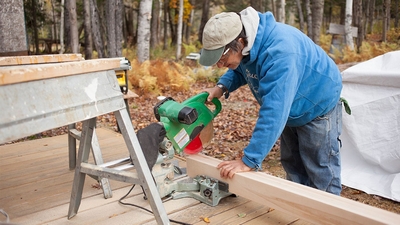
By Kathleen Steele Gaivin
The Department of Labor announced last week the availability of approximately $19 million in grants for current national recipients in the Senior Community Service Employment Program to apply for additional funding in a demonstration project for sector-based training for older workers.
Clif Porter, senior vice president of government relations at the American Health Care Association / National Center for Assisted Living, told the McKnight’s Business Daily that the groups were pleased to see more funding being made available for the program.
“Every day, long-term and post-acute care providers across the country see the vitality of America’s seniors. We know, perhaps more acutely than other professions, the importance of developing a sense of community and belonging in the overall health of seniors,” he said.
Too many older adults
are taking risky
sedative medications

BY WENDY LEVINSON, MD AND CHRISTINE SOONG, MD
A recent investigation in Quebec uncovered a concerning trend: benzodiazepines — medications commonly used for sleep or anxiety — are being overprescribed. This investigation has prompted the Quebec College of Physicians to closely examine the usage of these medications.
But this issue extends beyond Quebec’s borders; across Canada, these medications are being prescribed at alarming rates.
Benzodiazepines and other sedatives are often prescribed to older adults aged 65 and up for sleep or anxiety problems. However, long-term use poses serious risks for this age group, including memory problems, falls, and even an increased risk of death. When benzodiazepines are taken with other sedating medications, there is also an increased risk of overdose and over-sedation.
Despite these known risks, a 2022 report by the Canadian Institute of Health Information (CIHI) and Choosing Wisely Canada found that one in 12 Canadians over 65 are using these medications regularly.
Most baby boomers
want to stay put
in their big family homes —
exacerbating a major
US housing problem

By Vawn Himmelsbach
A recent Redfin survey of older American homeowners (aged 60 and over) found that more than three-quarters (78%) will consider staying in their current home as they age — or are already aging in place. While 16% said they’ll consider a 55+ community, 9% will consider moving to an assisted living/nursing home/elder care facility.
But, as the survey points out, this could be contributing to a larger housing problem in the U.S.
Why older Americans are ‘aging in place’
According to Redfin, more than a quarter (27%) of baby boomers who aren’t planning to sell their home anytime soon said it’s because their home is completely or almost paid off, and roughly one in five (21%) said they are staying put because home prices are now too high.
ARE YOUR PILLS
MAKING YOU SICK?

BY JULIA HUBBEL
According to a study by the American Association of Consultant Pharmacists, the average 60+ person in the United States fills upwards of 15 prescriptions a year. That leaps to 18 or more as we age.
Those in facilities are grotesquely overmedicated, often as a way to control behavior. This has led to some $177 billion in medical costs, much of which is pharma-related accidents, overdoses and interactions.
An article published in The Wall Street Journal claims that one in four women over 40 is on anti-depressants.
We get medicated for everything that ails us, much of which could be better dealt with using traditional medicine: better food choices, more exercise, having a purpose in life and finding happiness and gratitude in our everyday surroundings.
Why Are Syphilis Cases
Surging Among
55+ Americans?

BY JAZZ SHAW
In an era of ongoing disasters and emergencies, this is one problem that many of us probably hoped was mostly in our rearview mirror by this point, but apparently not. It turns out that we have recently seen a serious, significant comeback in sexually transmitted diseases (STDs) in the United States. But it's not uniform in the demographics where it is showing up and it doesn't apply to all STDs equally. The CDC is reporting sharp spikes in chlamydia and Hepatitis C, but the largest rise has been in syphilis. And the age group most likely to become infected is 55 years of age and older. There must be more to the explanation of this than meets the eye. (Fox News)
Sexually transmitted disease rates have risen sharply in a certain age group – and which group it is may surprise you.
The CDC's latest statistics on STDs in the U.S. show that chlamydia, Hepatitis C, and syphilis were among the diseases that have been infecting Americans aged 55 and older at an alarming rate. The statistics, which are as recent as 2022, show how STD rates have skyrocketed since 2000.
In Other News….
Hearing Aids Can Be Frustrating,
but Necessary, for Older Adults
By Judith Graham
It was an every-other-day routine, full of frustration.
Every time my husband called his father, who was 94 when he died in 2022, he’d wait for his dad to find his hearing aids and put them in before they started talking.
Even then, my father-in-law could barely hear what my husband was saying. “What?” he’d ask over and over.
Measuring Your Marbles:
The World of Powers of Attorney
Because this writer is now of “that age” and the topic of senior mental infirmity seems to be a focal point of the 2024 Presidential race, I have been watching a podcast about powers of attorney and their cousins the “springing powers.” The attorney leading the discussion seemed to be quite convinced that legal documents could be drafted that would effectively cover what should happen when (as he put it) “You lose your marbles.”

Write down your thoughts
and shred them
to relieve anger,
researchers say
Writing negative reactions on paper
and shredding it or scrunching and throwing
in the bin eliminates angry feelings, study finds

By Caroline Davies
Since time immemorial humans have tried to devise anger management techniques.
In ancient Rome, the Stoic philosopher Seneca believed “my anger is likely to do me more harm than your wrong” and offered avoidance tips in his AD45 work De Ira (On Anger).
More modern methods include a workout on the gym punchbag or exercise bike. But the humble paper shredder may be a more effective – and accessible – way to decompress, according to research.
A study in Japan has found that writing down your reaction to a negative incident on a piece of paper and then shredding it, or scrunching it into a ball and throwing it in the bin, gets rid of anger.


Unless you watch a lot of TV at 3AM, mostly all of the advertising and programming is geared towards a youth, or at least,a young market. And rightfully so. After all, it’s the youngsters that set the trends, go to the concerts, buy the clothes, eat at the trendy restaurants and, in general spend or are responsible for, how most of our discretionary income is spent. Therefore, one must ask, “If the youngsters are the focus of the media and the marketers, where does that leave us old folks?”
As the older generation, we often find ourselves overlooked in the media landscape. It seems like every commercial break is filled with ads featuring youthful faces, promoting products and experiences that are far from our interests. We're left feeling invisible, as if our needs and desires don't matter anymore.
But let's not forget, we are a significant demographic with unique preferences and purchasing power. We have a lifetime of wisdom and experience that should be acknowledged and respected. We may not be the ones attending the latest music festivals or wearing the trendiest clothes, but we still have a desire to be seen and catered to.
Fortunately, there are companies and marketers who recognize the value of the older generation. They understand that we have different priorities and interests, and they are starting to create content and products specifically tailored to us. From travel agencies offering senior-friendly vacation packages to fashion brands designing stylish yet comfortable clothing for mature bodies, there is a growing recognition that we deserve to be included in the media and marketing frenzy.
Moreover, as the population ages, the market potential for products and services targeting older individuals is expanding rapidly. The silver economy is booming, and businesses are beginning to realize the immense opportunities that lie in catering to our needs. From healthcare and financial services to leisure and entertainment, there is a vast untapped market waiting to be explored.
So, while it may sometimes feel like we're being left behind in the media and marketing world, there is hope on the horizon. We are slowly but surely gaining visibility and recognition. It's up to us, as the older generation, to demand representation and make our voices heard. By actively seeking out companies and brands that cater to our needs, we can show the industry that we are a force to be reckoned with.
Age should never be a barrier to receiving the recognition, appreciation, and sense of belonging that we all deserve. We may not be the ones setting the latest trends, but we still have a significant role to play in shaping the economy and society as a whole. ….


Old age isn’t what is used to be:
a versatile solution for a more
independent breed of seniors

By Michael Kure
An award-winning company from Down Under gives today’s seniors the power to access the services they need while keeping control of their own destinies and preserving their independence.
Writer Stephen King recently turned 76. Rock legends Paul McCartney and Ringo Starr just released the final Beatles song at the age of 81 and 83 respectively. Captain James T. Kirk himself, the venerable William Shatner, is 92. And none of them are resting on their laurels.
Imagine, there are adults today whose grandparents raved at Woodstock! So, it’s not surprising that many people in their seventies and eighties aren’t quite ready to think of themselves as “senior citizens,” let alone “elderly.”
6 questions to ask that
will make caring for
older relatives much easier
Your parents or other loved ones could
need you one day. Here’s how to get ready.

By Anna North
Anna North is a senior correspondent for Vox, where she covers American family life, work, and education. Previously, she was an editor and writer at the New York Times. She is also the author of three novels, including the New York Times bestseller Outlawed.
The women in Loretta Woodward Veney’s family are known for their longevity. Her grandmother died in her late 90s; her great-grandmother lived alone until she was 101, and only agreed to move into a nursing home “when we told her there were men,” Veney jokes. So when Veney’s mother was diagnosed with dementia at age 77, Veney, then 47, was shocked — and unprepared for the financial and logistical realities of caregiving.
Many millennial and Gen Z Americans will be faced with difficult decisions about elder care in the near future, if they aren’t grappling with it already. Baby boomers are reaching the age when they’re more likely to need support with medical care and daily tasks, and the ones providing that support are typically family members, often adult children. More than 40 million Americans today are caring for an older relative or friend, according to AARP, and many caregivers and former caregivers, like Veney, describe being taken by surprise when a loved one needed help, and feeling isolated by the lack of public discussion around aging and disability.
Wasabi effective in
improving memory
of elderly: study
A research has found that hexaraphane —
a component found in wasabi —
helps improve the episodic and
working memories of elderly people.

A recent study has found that wasabi, a traditional Japanese spice and popular sushi condiment, may be beneficial in enhancing elderly people's memory and cognitive abilities.
The research, conducted jointly by Japanese food manufacturer Kinjirushi and Tohoku University, focused on a type of mustard oil called hexaraphane found in small quantities in the plant's roots and rhizomes.
The research looked into whether the compound, already known to have antioxidant and anti-inflammatory effects on the body, has a positive impact on cognitive function for healthy adults aged 60 years and over.
Millions more older adults
won't be able to afford housing
in the next decade, study warns
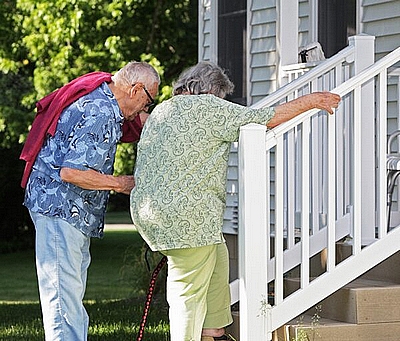
By Claire Thornton
More older adults will experience housing insecurity in the coming years unless the country dramatically increases its supply of affordable homes for people ages 65 and up, who make up roughly one-fifth of the nation.
A growing share of people with low and fixed incomes will struggle to afford appropriate housing in the coming decade, as the number of older Americans is expected to skyrocket, Harvard researchers said in a report this week. By 2040, the number of households headed by someone age 80 or older will balloon to 17 million, according to the report.
"There is a good news part of this, in that it's not a bad thing that there are a lot more older people living longer," Jennifer Molinsky, the report's lead author, told USA TODAY. "We just don't have the housing and supports that we need for this growing population."
Enzyme Linked To
Loss Of Muscle Mass In
Older Adults, Study Finds

By William A. Haseltine
This article is part of a broad series on recent advances in the science and medicine of longevity and aging. The series covers a range of topics, including musculoskeletal health. Expect more articles on bone and muscle regeneration to follow.
Muscle is what keeps us moving. It is integral to athletic performance, yes, but also to everyday activities. This is all the more relevant as we age: past 30, we begin to lose 3% to 5% of our muscle mass per decade. Such age-related loss of muscle, called “sarcopenia”, in technical speak, can lead to frailty and immobility down the line, both of which worsen quality of life. Researchers with the Blau Lab at Stanford University are taking things into their own hands, piecing together the various causes for muscle decline with age. Their latest findings, published in Science, suggest that nerve-muscle connections may be a key part of the equation, and that reestablishing these connections helps bring back and maintain muscle and strength.

KIDNEY FACTS
1.The kidneys are two bean-shaped organs located on either side of the spine, just below the rib cage.
2. The main function of the kidneys is to filter waste products and excess fluids from the blood to form urine.
3. Each kidney contains about one million tiny units called nephrons that filter the blood.
4. The kidneys produce hormones that help regulate blood pressure, red blood cell production, and calcium balance.
5. Kidney stones are solid deposits that form in the kidneys and can cause severe pain when they pass through the urinary tract.
6. Chronic kidney disease is a long-term condition where the kidneys gradually lose their function and can eventually lead to kidney failure.
7. Acute kidney injury is a sudden decrease in kidney function that can be caused by dehydration, infection, or medication.
8. Dialysis is a treatment for kidney failure that uses a machine to filter waste products from the blood.
9. Kidney transplant is a surgical procedure in which a healthy kidney is transferred from a donor to a recipient with kidney failure.
10. It is important to drink plenty of water, maintain a healthy diet low in salt and sugar, and avoid smoking to keep your kidneys healthy.

NEXT EDITION
FRIDAY APRIL 19, 2024

©2024 Bruce Cooper

-30-
*************
THIS PAGE IS BEST VIEWED IN
LANDSCAPE MODE

Monday April 15, 2024

NEW Email: TheSeniorLog-usa@HOTMAIL.COM
“Doctors say it's okay to have
sex after a heart attack,
provided you close
the ambulance door.”
Phyllis Diller

Cannabis Use
Linked to Lower
Dementia Risk

Summary: Recreational cannabis use may be associated with a significant decrease in the odds of experiencing subjective cognitive decline (SCD) in adults over 45. Analyzing data from the CDC’s 2021 Behavioral Risk Factor Surveillance System, researchers found that recreational users had 96% lower odds of reporting SCD compared to non-users.
This intriguing finding suggests potential protective effects of cannabis on cognition, although the study’s authors emphasize the need for longitudinal research to understand the long-term impacts. Despite its limitations, the study contributes to the evolving conversation around cannabis use and cognitive health, highlighting the importance of differentiating between medical and recreational use in research.
Key Facts:
- Recreational cannabis use was associated with a significantly lower risk of subjective cognitive decline in adults over 45.
- The study is unique in its examination of cannabis use’s type, frequency, and method, focusing on an older population.
- There was no significant difference in the odds of SCD related to cannabis consumption frequency and method, suggesting the potential role of THC content in protective effects against cognitive decline.
This vitamin deficiency
can cause forgetfulness
and mimic symptoms of
dementia—but it’s reversible.
Doctors explain
the signs to look for

BY KORIN MILLER
About 5.8 million people in the U.S. have Alzheimer’s disease and related dementias, giving these life-altering illnesses a wide impact across the country. But while it can be devastating when a loved one shows signs of memory loss, doctors say you shouldn’t automatically assume they have dementia.
Several factors can cause a person to have classic signs of dementia, including a deficiency in vitamin B12. “Vitamin B12 deficiency can cause cognitive impairment, including impairments in thinking,” says Dr. Scott Kaiser, a geriatrician and director of Geriatric Cognitive Health for the Pacific Neuroscience Institute in Santa Monica, CA. “That can definitely mimic signs of dementia.”
Couple that with the fact that older adults are more likely to have trouble fully absorbing vitamin B12, putting them at risk for a deficiency, and doctors say that vitamin B12 deficiency should at least be on the radar of people with older loved ones. Unlike dementia, this is a health issue that can be reversed.
Millennials Are
Exchanging Anecdotes
About How They're Noticing
That Their Parents
Are Turning Into Awful People
Maybe it isn't your folks,
but you definitely know a
boomer who is doing these things.

By Brian Galindo
If there is anything millennials can all agree on, it's that we're getting old! Of course, so are our parents, which means we're now dealing with them as senior citizens. And if you're a millennial with boomer parents, you've probably noticed that their idiosyncrasies have gotten worse and that they're getting more and more set in their ways.
However, with some people, as they get older, it goes beyond quirks and stubbornness and to them becoming downright bitter and meaner. Recently, I stumbled upon a thread from a couple of months ago where user StyrkeSkalVandre was interested in just that when they asked millennials: "Has anyone else noticed their parents becoming really nasty people as they age?"
6 Supplements
You Should Never Take
If You're Over 60,
Doctors Say
SOME OF THESE VITAMINS,
MINERALS, AND NUTRIENTS
CAN CAUSE HEALTH ISSUES FOR SENIORS.

BY ZACHARY MACK
Establishing good health habits when you're younger that carry over into your older years can help keep you feeling your best. Your routine may include taking dietary supplements, to ensure you're getting all the vitamins and minerals everyone needs or to help address a specific deficiency. However, this health habit can become riskier when you reach a certain age.
"In some cases, supplements can cause problems in older adults because they interact with common prescription medications," says Leann Poston, MD, a licensed physician and health advisor for Invigor Medical. "Talk with your doctor before taking supplements to ensure they are safe for you."
Wondering what you should drop from your daily nutrition regimen as a senior? We've asked the experts to weigh in on the most important changes you should consider right now. Read on for the worst supplements to take if you're over 60, according to doctors.
The world's oldest man
shares secrets
to his longevity
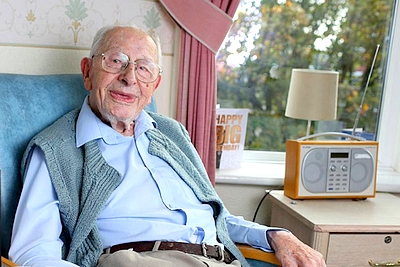
LONDON — The world's oldest man says the secret to his long life is luck, moderation — and fish and chips every Friday.
Englishman John Alfred Tinniswood, 111, was confirmed as the new holder of the title by Guinness World Records.
That followed the death of the Venezuelan record-holder, Juan Vicente Pérez, this month at the age of 114. Gisaburo Sonobe from Japan, who was next longest-lived, died March 31 at 112.
Tinniswood was presented with a certificate by Guinness World Records on Thursday at the care home where he lives in Southport, northwest England.

10 Best Exercises
for Seniors
To Lose Belly Fat

By Adam Meyer
As you age, it's totally normal to accumulate some extra padding around your midsection. But that doesn't mean carrying around extra belly flab isn't frustrating or challenging. Fortunately, we're here to help. If you're an older adult looking to shed unwanted belly fat, you're in the right place. We chatted with Rachel MacPherson, CPT, an ACE-certified personal trainer with Garage Gym Reviews, who shares the 10 best exercises for seniors to lose belly fat.
Belly fat, or visceral fat, can be particularly stubborn and harmful to your health. According to the National Heart, Lung, and Blood Institute, excess abdominal fat has been linked to an increased risk of heart disease, diabetes, and other chronic conditions. The risk increases with a waist circumference exceeding 35 inches for women or 40 inches for men. The good news is that by incorporating the following exercises into your workout routine, you can slim down your waistline and boost overall health and fitness.
However, MacPherson reminds us that you can't spot target fat loss from one specific area of your body. She says, "While no exercise can target belly fat specifically, there are some that will help burn calories or help strengthen and tighten the abdominal muscles for a more slim appearance."
MORE STORIES FOR A MONDAY
How age-friendly universities
can improve the second half of life
By 2030, more than 1.4 billion people across the globe will be at least 60 years old. This number will shoot up to 2.1 billion by 2050. At this point, there will be more people age 60 or older than people between 10 and 24.
\\\\\\\\\\\\\\\\\\//////////////
RV TRAVEL TIPS FOR SENIORS
Setting out on a trip in the comfort of a recreational vehicle (RV) is an exhilarating experience, and for you, as a senior, it presents a unique opportunity to explore the world at your own pace. RV travel offers a blend of adventure, flexibility, and the comfort of a home on wheels.


TRUMP ON TRIAL
Former president Donald Trump is set to stand trial today ( Monday April 15, 2024)in New York, marking the first time a former president faces criminal charges. The jury will determine whether he is guilty of allegedly paying hush money to Stormy Daniels using company funds. Regardless of the outcome, Trump's supporters are likely to view him as victorious. Here’s why.
Scenario 1. Trump is found not guilty.
In an unexpected turn of events, Trump has been acquitted. It seems that the evidence presented by the Manhattan DA was not sufficient to sway the jury, much to the delight of Trump and his supporters. He will undoubtedly use this victory to further push his narrative of being a victim of a witch hunt and to criticize his political opponents. Get ready to hear more of the same from him.
Scenario 2. Trump is found guilty.
The DA's case proved to be too strong against him, leading to his being held over for sentencing. Despite some jurors possibly being on his side, the evidence was irrefutable. His lawyers managed to find an excuse to appeal the verdict, causing further delays in the pursuit of justice. Eventually, he will lose the appeal and face sentencing. Trump's 34 felony counts are considered "Class E felonies" in New York, with a maximum penalty of 20 years in prison for each count. The judge may decide whether to order concurrent or consecutive sentences, but the sentencing for Class E felonies is capped at 20 years in New York. His legal team will likely appeal the sentence, fueling his rhetoric and gaining more support from his followers. Regardless of guilt, he emerges victorious.*
Scenario 3. Hung jury.
Experts say there is an 80% chance there will be at least one unwavering Trump idolizer on the jury. After days of deliberation, that one juror remains sure of Trump’s innocence. Since all 12 jurors have to agree on a verdict, the trial will end in hung jury or mistrial. It will be up to the prosecutors weather to retry the case. Trump sees this as a victory as it does exactly what he wanted to do all along. Delay, delay, delay.
He will continue to use this as evidence of his innocence and claim that the justice system is biased against him. His supporters will rally behind him even more fervently, viewing the hung jury as a victory for their cause. The political divide in the country will only deepen as Trump's rhetoric becomes more emboldened and his critics become more vocal in their opposition. The future remains uncertain as the legal battle continues, but one thing is for sure - this is not the last we’ll be hearing from Trump and the MAGA’s. His influence and impact on American politics will persist for years to come. ...

*EDITOR'S NOTE: There are four charges of fraud against Trump, each carrying a maximum penalty of 20 years. The judge is likely to have them served concurrently. Even if Trump serves only half of his sentence, he faces a significant amount of time in jail. Unfortunately, no matter how long he is incarcerated, it will not change his character. He will not gain humility or restraint. A fair sentence I would like to see is for him to complete 1 year of community service at a VA hospital, homeless shelter, or cleaning up trash on the New York State Thruway.

FTC Issues Report
to Congress
How to Meet the Housing Needs
of Older Adults Aging in Place
PIC A1

By Erika Zelaya
As the population of older adults continues to increase, the challenge of aging in place—or living in one’s home independently—has become more pressing. However, for aging in place to be a viable option, suitable housing is crucial. Unfortunately, many older adults face challenges in finding and affording housing that’s safe, accessible, and meets their changing needs as they age. How can policymakers meet the housing needs of older adults wishing to age in place?
The population of older adults is on the rise:
In the US, more than 1 in 6 Americans are now 65 or older, according to a report from the Administration on Aging (PDF). That represents 55.7 million people, or an increase of 38 percent since 2010. By 2040, the report estimates that there will be 80.8 million residents 65 and older. A 2021 Home and Community Preferences survey by AARP found that about 75 percent of people older than 50 want to stay in their homes or communities for as long as possible.
Yet, as older adults age in place, they may encounter a range of housing-related challenges that impede their ability to remain in their homes:
Two-thirds of those 50+
anxious about assisted living
affordability: survey
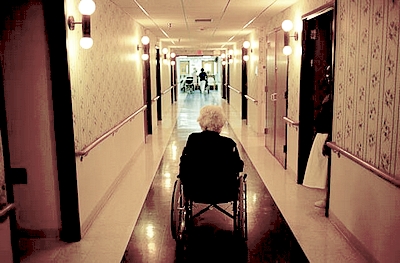
By Lois A. Bowers
Two-thirds (66%) of Americans aged 50 or more years participating in a recent poll said they are “mostly” or “somewhat” anxious about being able to afford the cost of an assisted living community or nursing home if they need to move to one.
KFF conducted the survey in May 2022 as part of a larger project and published the results Nov. 17.
Increasing age and income tempered concern about assisted living affordability. For instance, 73% of respondents aged 50 to 64 and 57% of those aged 65 or older said they were mostly or somewhat anxious about their ability to afford assisted living, as were 77% of participants with household incomes of less than $40,000, 60% of those with household incomes of $40,000 to $89,900, and 48% of respondents with household incomes of $90,000 or more.
Aging In Place Remodeling:
A Checklist For Senior Homes

By Nicole Gregory
Many people hope to stay in their homes as they age rather than move in with a relative or into an assisted living community. In fact, a 2021 poll conducted by AARP found 75% of people at least 50 years old want to live in their homes as long as possible[1].
“However, the needs and wants of the aging population often don’t match up with the reality of our aging homes,” says Eve Hill, a California-based certified aging in place specialist and co-founder of consulting company Customized Aging.
But a few key remodeling projects can make a home safe and liveable for the long term. “You can leverage design to prolong your independence,” says Hill. Here’s what you need to know.
Suicides in U.S.
hit historic high in 2022,
driven by increase
among older adults

BY EMILY ALPERT
Rising rates of suicide among older adults drove the number of such deaths to a historic high in the United States last year, even as suicide declined among youth, according to a report released Wednesday by researchers at the Centers for Disease Control and Prevention.
More than 49,000 people died by suicide in 2022 across the country, the highest tally recorded for the nation, according to federal figures. It’s the latest evidence of a troubling trend in the U.S., where suicide has been on the rise for much of the 21st century.
The U.S. suicide rate fell somewhat between 2018 and 2020, but then resumed its upward trend, alarming health officials. After adjusting the raw numbers to account for the age distribution of Americans, CDC researchers found that the nation’s suicide rate last year was 14.3 deaths per 100,000 residents — a level not seen since 1941.
Building up thighs
may prevent
knee replacement

By Dennis Thompson
Squats and lunges aren't the most fun exercises, but a new study says they'll help save your knees.
Folks with strong quads building up their thighs appear to be less likely to require a total knee replacement, according to a presentation scheduled for Monday at a meeting of the Radiological Society of North America (RSNA) in Chicago.
Stronger muscles are generally associated with a lower rate of total knee replacement, researchers said in background notes.
However, it's been unclear whether people benefit more from stronger extensor muscles like the quadriceps, which extend the leg, or stronger flexor muscles like hamstrings that bend the leg.

10 Facts About
Your Aging Heart
1. As people age, their heart muscles may weaken or stiffen, leading to a decrease in overall heart function.
2. Aging can cause changes in the blood vessels, making them less flexible and more prone to plaque buildup, which can increase the risk of heart disease.
3. Age-related changes in the heart's electrical system can lead to a higher risk of arrhythmias, or irregular heartbeats.
4. The heart's ability to respond to stress or physical activity may decrease as people age, leading to less efficient pumping and blood flow.
5. Aging can also affect the heart's ability to regulate blood pressure, which can increase the risk of hypertension and other cardiovascular problems.
6. The risk of developing heart disease increases with age, with older adults being more likely to have conditions such as coronary artery disease or heart failure.
7. Age-related changes in the heart can also affect its ability to recover from illness or injury, making older adults more vulnerable to heart-related complications.
8. Aging hearts may be less able to adjust to changes in temperature or stress, making it important for older adults to take precautions to protect their heart health.
9. Regular exercise and a healthy diet can help slow the aging process of the heart and reduce the risk of developing cardiovascular problems.
10. It is important for older adults to have regular check-ups with their healthcare provider to monitor their heart health and address any potential issues early on.

NEXT EDITION
WEDNESDAY APRIL 17, 2024

©2024 Bruce Cooper

-30-
*************
THIS PAGE IS BEST VIEWED IN
LANDSCAPE MODE

Friday April 12, 2024
Email: TheSeniorLog@Protonmail.com
“Should any political party attempt
to abolish social security,
unemployment insurance,
and eliminate labor laws and farm programs,
you would not hear of that party again I
n our political history.”
Dwight D. Eisenhower

Higher Than Expected Inflation
Lifts 2025
Social Security COLA Estimate
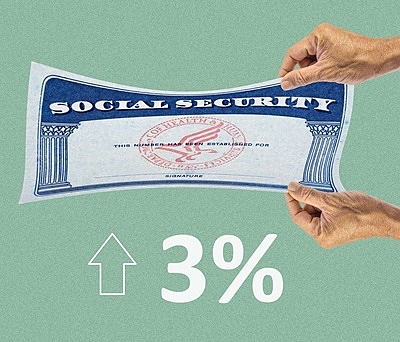
BY TED GODBOUT
We’re still several months away from knowing what the final Social Security cost of living adjustment (COLA) will be for 2025, but the federal government's inflation data for March has pushed the COLA estimate higher, while dampening hope for future rate cuts.
That's higher than the inflation trends indicated last month based on February’s CPI-W data. Based on this trend, The Senior Citizens League (TSCL) has adjusted its COLA forecast to 2.6% in 2025, up from 2.4% in February and 1.75% in January. Still, that’s a far cry from the 8.7% COLA increase seen in 2023.
TSCL notes that its estimates may change monthly, relying on the latest CPI data. The final COLA for 2025 may differ from these estimates because it's computed based on the average inflation rate during the third quarter (July, August, and September) determined by the percentage of change in the CPI-W and then compared to the same period a year prior. Six months' worth of data still needs to be collected, leaving plenty of room for change, the organization observes.
Republican Suggests
Thousands of Seniors
Shouldn't Be Voting

By Andrew Stanton
Republican Senate candidate Eric Hovde suggested most nursing home residents should not be voting because they only have "five, six months life expectancy."
Hovde is challenging Democratic Senator Tammy Baldwin in Wisconsin, a crucial swing state that could determine which party controls the Senate and whether President Joe Biden or former President Donald Trump wins the 2024 presidential race. While Baldwin has easily won reelection in the past, Republicans see the close presidential race as an opportunity to flip the Senate seat, largely rallying around Hovde ahead of the August 13 primary.
Hovde, who is endorsed by Trump, is facing criticism over recent remarks made about nursing home residents voting in the 2020 presidential election during an April 5 interview on the Guy Benson Show.
Recent contact
with young children
linked to over 60s risk
of acquiring
pneumonia-causing bacteria
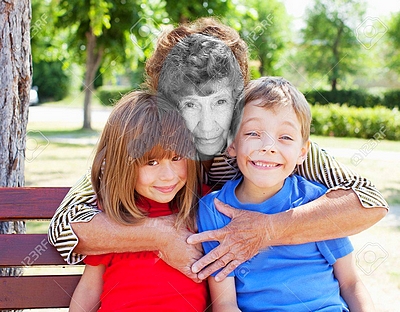
New research being presented at this year's European Congress of Clinical Microbiology and Infectious Diseases (ECCMID 2024) in Barcelona, Spain (27-30 April) finds that pneumonia-causing bacteria are common in the over 60s and that contact with pre-school and young school-aged children appears to be the most important factor in the onward transmission of Streptococcus pneumoniae (pneumococcus) to the over 60s.
Pneumococcus is the main bacterial pathogen involved in ear and sinus infection, but is also a major cause of more severe diseases such as pneumonia, sepsis, and meningitis. Pneumococcal infections mainly affect children under two and the elderly, and claim almost two million lives worldwide every year.
The US CDC estimates that pneumococci cause more than half of all cases of bacterial meningitis in the U.S. with around 2,000 cases of pneumococcal meningitis occurring each year. Over 150,000 hospitalizations from pneumococcal pneumonia occur every year in the U.S., and pneumococci is also the most common bacterial cause of childhood pneumonia, especially in children under 5 years. In adults, pneumococci account for 10% to 30% of adult community-acquired pneumonia.
Let’s Get Ready
for Allergy Season!

By Meredith White
It’s that time of year! Spring has sprung and so have allergies for some of us. There is still time to get ready for allergy season to help reduce the symptoms. Preparation for allergy season can make a difference for yourself and loved ones.
While you can get allergies at any age, seniors are particularly apt to develop them or continue to have them if they have any chronic ailments.
Seniors with allergies tend to really feel the impact of symptoms and this can impact their quality of living.
Here are 3 ideas ...
18 Affordable Places
to Retire Outside
the US for
$2,000 a Month

By Rabia Mazhar
This article takes a look at 18 affordable places to retire outside the US for $2,000 a month. If you wish to skip our detailed analysis on navigating the retirement period as a US citizen, you may go to 5 Affordable Places to Retire Outside the US for $2,000 a Month.
The Retirement Journey: Trends and Tribulations
According to the United States Census Bureau, more than one in five Americans will be over the age of 65 by 2030. With over 20% of a country’s population in the senior citizen category, the obvious question arises - what does retirement in America look like? For many, retirement is a time of financial difficulty. The National Council on Aging estimates that over 17 million American senior citizens are economically insecure - that’s about 1 in 3 older adults. For these 17 million older adults, incomes fall below 200% of the federal poverty level. The National Council on Aging also sheds demographic light on who comprises the 17 million. Here, it comes as no surprise that older women have a greater chance of living in poverty as they are behind on income due to wage discrimination and time spent on unpaid childcare and domestic labor.

7 STEPS TO HELP
YOU DEAL WITH
ANGER AFTER 60

BY SALLY FOX
Anger is natural, but when it builds up in us, it can be incapacitating, causing us to lash out at others, or lash out at ourselves and lead to depression.
When anger threatens to overwhelm your day, here’s a way you can shift your mood and carry on, without telling yourself that you, “shouldn’t feel angry.”
Growing up in the 50s, I heard the subtle – and sometimes not-so-subtle – message: “Nice girls shouldn’t be angry.” I learned to swallow my anger and allow it to rest, like bile, inside of me.
Anger and outrage aren’t bad – in fact, at times, they’re appropriate. Violence against women and girls should make us angry. But let’s use our anger to act, not stockpile it in our guts.


If someone were to ask you, "How are you doing?" chances are you would respond with a smile and politely say, "I'm okay, how about you?" It's a common courtesy to avoid delving into the nitty-gritty details of our struggles and worries. After all, who has the time for that? So, we simply brush it off and continue on our way, trying to maintain a sense of cheerfulness.
But what if we were to take a moment and truly assess how we're really doing? What would we discover? Every now and then, I find myself doing just that, and to my surprise, I realize that I'm actually doing okay, considering everything.
The most important thing for me is to be at peace with myself. It hasn't always been this way though. There was a time when I didn't particularly like myself. I was filled with anger towards my body for its health issues. I was frustrated that the plans I had made for my personal time after decades of work were shattered, and it seemed like a life of declining health, doctors, and nursing homes awaited me.
However, amidst all of that, I have managed to not only live with these challenges but also accept them. It's true that some of my fears have come true, but I've learned to make peace with them.
It's taken some time, but I've come to embrace the reality that my choices are somewhat restricted and the fantasy of a carefree life may not materialize. However, I've also come to understand that although it's enjoyable to have a beautiful home, a fancy car, stylish clothes, and wealth, I possess all the essentials I require, no matter how simple they may seem.
Living in an assisted living facility wasn't exactly what I had in mind for my retirement years, but it's actually not too shabby. I have a cozy place to call my own, with the freedom to come and go as I please. If I ever need anything, all I have to do is ask and it's taken care of. The food could use some improvement, but I'm definitely not going hungry. While transportation is a bit of a challenge, my decreased mobility means I don't rely on it as much. Plus, I still have some extra cash at the end of each month for personal expenses. I know not every senior has it as good as I do, so I consider myself fortunate. Sure, my health could be better with a few chronic conditions, but I've learned that focusing on the negatives only makes things worse. The last thing I need is to mess with my own head.
So, when someone inquires about my well-being, I can genuinely respond with "not too shabby." I hope you can do the same. Wishing everyone a delightful weekend.......


Boomers Know Best —
If You Have to Hustle,
It's Not Passive Income

BY KENNY ROSE
Key Takeaways:
- There's a clear divide in how different generations perceive and pursue passive income.
- Many people, particularly younger generations, misunderstand the true nature of passive income.
- True passive income typically comes from investments that require minimal ongoing effort, such as dividends from stocks, interest from bonds, or earnings from real estate and other alternative business assets.
Investors have coveted passive income streams since the early days of the COVID lockdown, when we were all sitting around on our laptops, figuring we might as well make a few extra bucks. Its popularity shows no sign of waning — not with inflation surging and eggs at $5 a dozen.
The pursuit of passive income ignites young and old investors alike. In a recent survey of 1,000 US investors with at least $10K in assets, the State of Alternative Assets report, respondents across age demographics ranked it as a top 2023 priority. But while passive income is a common goal, there's an increasingly clear divide in how generations understand and earn passive income. Gen Z and Millennials see it as a dependable stream of income outside their main paycheck and seek it via crypto and side hustles. Gen X and Boomers take the set-it-and-forget-it approach, and look for passive income via capital appreciation.
Exploring Medicaid Payments
for Assisted Living:
What You Need to Know

BY DANIEL COBB
When it’s time for you or a senior you care for to look into assisted living, the cost can quickly turn into an obstacle. According to Genworth Financial’s Cost of Care Survey, the average senior pays $4,500 a month for assisted living, with prices going much higher in many places. Paying for this can be a challenge, especially for older adults with limited incomes.
Many seniors with limited resources receive health care coverage through their state’s Medicaid program, which may open the door to financial assistance in paying for care. Assisted living communities house seniors in a safe, caring environment where their needs can be taken care of by trained staff. These are not medical facilities like skilled nursing homes, but they do offer help with activities of daily living and chore assistance. Many communities also offer premium features such as concierge services and lifestyle classes.
Assisted living communities house seniors in a safe, caring environment where their needs can be taken care of by trained staff. These are not medical facilities like skilled nursing homes, but they do offer help with activities of daily living and chore assistance. Many communities also offer premium features such as concierge services and lifestyle classes.
50-year-old muscles just
can’t grow big like they used to
— according to science

There is perhaps no better way to see the absolute pinnacle of human athletic abilities than by watching the Olympics. But at the Olympics – and at almost all professional sporting events – you rarely see a competitor over 40 years old and almost never see a single athlete over 50. This is because with every additional year spent on Earth, bodies age and muscles don’t respond to exercise the same as they used to.
I lead a team of scientists who study the health benefits of exercise, strength training and diet in older people. We investigate how older people respond to exercise and try to understand the underlying biological mechanisms that cause muscles to increase in size and strength after resistance or strength training.
Old and young people build muscle in the same way. But as you age, many of the biological processes that turn exercise into muscle become less effective. This makes it harder for older people to build strength but also makes it that much more important for everyone to continue exercising as they age.
What’s the Key to
a Secure Retirement?
The answer is long-term planning,
but if you, like so many other retirees
and others approaching retirement,
have planning gaps,
here’s what you can do.

BY ANNA M. RAPPAPORT
By the time a person approaches retirement age, they have enough life experience to know that change and the unexpected are, well, expected. On the other hand, human beings also tend to focus on what’s right in front of them, and retirees and those approaching retirement are no different.
Studies have found that many people at or near retirement age have major gaps in their planning, making them vulnerable to financial problems in retirement.
Misperceptions put retirement nest eggs at risk:
A result of gaps in knowledge and failure to think about the long term is a focus on cash flows and expected bills and not on unexpected events. The SOA Research Institute has studied shocks in retirement, and it found that retirees are resilient and able to deal effectively with many of them, but not all.
9 Simple and Effective
Online Safety Tips
for Seniors

By Ben Pilkington
A recent Pew Research survey found that three-quarters of people aged over 65 are online every day, 61% own a smartphone, and 45% are users of at least one social media platform like Facebook, Twitter, or Instagram.
When people from any group go online more often, they expose themselves to more online risks.
And as seniors engage more with the online world, they are more likely to become targets for cybercriminals. It has been estimated that older people in the US lose $30 billion annually due to cybercrime.
Your best defense against cybercriminals is yourself.
Arming yourself with a few simple, effective, and memorable safety tips is the best way to protect yourself from online risks like scams, fake news, and abusive trolls.

MOST JOBS TODAY
DID NOT EXIST IN 1940
About six out of every 10 jobs people do today didn’t exist in 1940, according to a new analysis of US census data from 1940 to 2018 led by an MIT economist. While many of those jobs were created by new technologies, some came from changing consumer needs. And while in the first 40 years of that nearly 80-year period most of the new jobs, which included many manufacturing and clerical positions, were scooped up by the middle class, the more recent jobs have tended to be either highly paid white-collar roles or lower-wage service jobs.

NEXT EDITION
MONDAY APRIL 15, 2024

©2024 Bruce Cooper

-30-
*************
THIS PAGE IS BEST VIEWED IN
LANDSCAPE MODE

Wednesday, April 10, 2024
Email: TheSeniorLog@Protonmail.com
“You will kill ten of us, we will kill one of you,
but in the end, you will tire of it first.”
― Ho Chi Minh

New income limit
confirmed for
Social Security benefits
in April
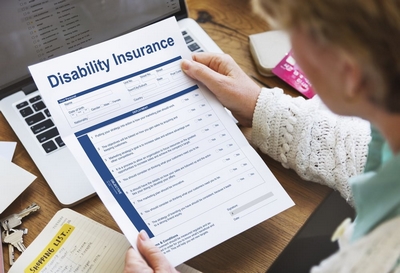
Social Security announces new changes to SSI: More benefits for seniors and the disabled
New large COLA increase for 2025: How it will affect VA Benefits
New large direct payment Stimulus Check in April: $1,312 will be sent in a few days
The Social Security Administration (SSA) approved a new income restriction for receiving Social Security benefits in April. If you currently receive Social Security payments while working, then you should be informed of the new income restrictions that go into effect this month to ensure that you continue to receive your monthly benefits.
You can thank
the baby boomers
for the stunning strength
of the US economy
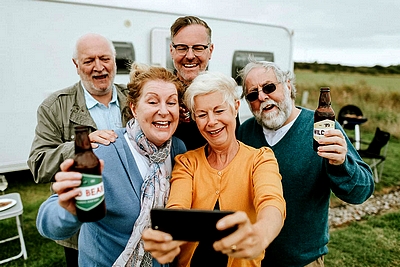
By Matthew Fox
- You can thank baby boomers for the strong US economy, according to market veteran Ed Yardeni.
- Boomers are by far the richest generation, and they're spending more money as they retire in droves.
- "Seniors are traveling more, dining out more, and visiting their health care providers more," Yardeni said.
The US economy has baby boomers to thank for its strength and resilience even as some worry about a potential recession.
According to market veteran Ed Yardeni, the baby boomer generation is powering spending in key areas of the economy that have seen massive job gains in recent years.
Surveillance Colonoscopy
Rarely IDs Cancer
in Older Adults

By Lori Solomon
Colorectal cancer (CRC) is rarely detected from surveillance colonoscopy among older adults, regardless of prior adenoma findings, according to a study published online April 2 in JAMA Network Open.
Jeffrey K. Lee, M.D., M.P.H., from Kaiser Permanente Northern California in Oakland, and colleagues estimated surveillance colonoscopy yields in older adults. The analysis included 9,601 individuals 70 to 85 years who received 9,740 surveillance colonoscopies at a large, community-based U.S. health care system (2017 through 2019) and had an adenoma detected ≥12 months previously.
The researchers reported that CRC yields were found in 0.3 percent of procedures, advanced adenoma in 11.7 percent, and advanced neoplasia in 12.0 percent. There were no significant differences in yields across age groups. CRC yields were significantly higher for colonoscopies among patients with a prior advanced adenoma versus nonadvanced adenoma (0.5 versus 0.2 percent). A similar pattern was seen for advanced neoplasia (16.5 versus 10.6 percent). Detection of advanced neoplasia at surveillance was associated with prior advanced adenoma (adjusted odds ratio [aOR], 1.65), body mass index ≥30 versus <25 kg/m2 (aOR, 1.21), and having ever smoked tobacco (aOR, 1.14). There was an inverse association between Asian or Pacific Islander race and advanced neoplasia.
What seniors worry about

By Matilda Charles
According to an informal survey by writer Matilda Charles, the number one concern for seniors was about money, including paying bills.
It's very helpful to have friends and acquaintances scattered across the country when I need to do another informal poll. This time my questions to them concerned what seniors worry about.
I got them started with a list of suggestions on a page, to be ranked in order, with a blank place under each one for comments, and space below for their own contributions.
And I wasn't surprised.
The number one concern was about money. Is there enough to last the rest of our life? Will grocery prices ever come down again? We're concerned about having to go back to work to keep from burning through our savings, running up medical bills, losing the house because of not being able to pay the mortgage and having the rent raised to an amount we can't pay.
Older Adults
Who Never Got Married
Revealed The "Myths"
About Being Single
Later In Life
That No One Talks About
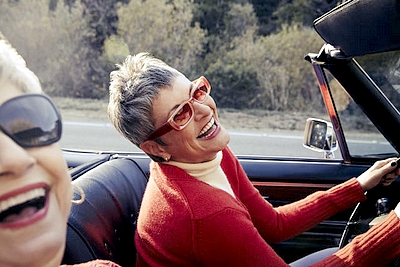
By Liz Richardson
We recently wrote a post where older adults who never got married shared the "myths" about being single later in life that they want people to know. Over 100 of them originally submitted their stories and perspectives, so here are just 21 more of their thought-provoking responses:
1. "I never married. I had two kids, a sperm donor. I have an incredible village helping me raise my kids, and I knew that going in. I can count on the fingers of one hand the number of times I've thought, 'Hmmm, this would be easier with a partner.''
"More often than not, I see friends going through awful, painful divorces with a partner, kids caught in the middle, and I am SO glad I never got married JUST to have kids."

HOW BEING “OLD”
MAKES ME
MORE SUCCESSFUL

BY STEPHANIE BRODT
When we were in our 20s and 30s we had many advantages in life. Do I need to list them all? I don’t think so. We are very aware of those advantages… both the real ones and the imagined.
But, as we age, we begin to realize (hopefully) that with all the disadvantages of growing older there are many, MANY advantages that come along with it as well.
When I was “let go” from my job at the age of 48, I was finding it hard to remember those supposed MANY advantages of getting older.
After all, I was a middle-aged, over-weight (not that THAT had anything to do with anything – just thought I’d add it here), unemployed secretary that had no idea of what the next step should be.


At the ALF.
Poor turnout for eclipse.
Why Do Old folks
stop caring about the
World around them?
Yesterday, a significant event unfolded across a vast area of the U.S. It was a rare occurrence that many of us will only witness once in our lifetime. The next one is not expected until 2079. Consequently, a few of us, including myself and fellow residents of the Asylum, stepped out of our rooms in the afternoon to gaze at the sky. Our moon positioned itself between the sun and the earth, although we didn't witness a total eclipse, it was still a momentous occasion. Interestingly, only around 30 out of the approximately 200 residents here showed interest in observing this phenomenon, despite the extensive coverage on TV and within the A.L.F. This made me ponder: when do we reach a stage in our old age where we no longer care about the world around us?
I've always been a news “junkie. “ When I was a kid (around 10 or 11 years old), I recall watching the news with John Cameron Swayze. It was just a 15-minute broadcast during dinner time, but I was captivated by it. My curiosity about global events persisted through my teenage years. Whenever Walter Cronkite or Huntley-Brinkley appeared on TV, I would pause to watch. Even today, CNN is on in the background as I write this blog. Despite my age, I'm still very much alive and interested. However, many of my neighbors seem oblivious to current events. It's not that they are mentally impaired, they simply lack interest. This concerns me because I wonder if I too will lose interest at some point. And that frightens me.

Firstly, I believe that by not actively seeking out information about the world around them, my neighbors are missing out on valuable knowledge and insights. Staying informed about current events allows us to understand the complexities of the world, make informed decisions, and engage in meaningful conversations. It broadens our perspectives and helps us become more empathetic and aware citizens.
Secondly, I worry that this lack of interest in current events may lead to isolation. In an increasingly interconnected world, being unaware of what is happening globally can create a sense of detachment and disconnect from society. It becomes challenging to engage in conversations or contribute to discussions when one is unaware of the latest news and developments. This isolation can have far-reaching consequences, both personally and socially.
Lastly, I can't help but wonder if I too will eventually lose interest in staying informed. As I grow older, will my enthusiasm wane, and will I become indifferent to the events shaping our world? It's a thought that lingers in the back of my mind, reminding me to cherish and nurture my passion for news while I still have it. I just wish more seniors, especially now that our democracy is threatened, would care just a little more. ……………….


Is Tipping
Getting Out of Control?
Know when,
and when not, to tip

By Donna Fuscaldo
If you feel like requests for tips are everywhere, you’re not alone. From dry cleaners to shops, prompts to provide a gratuity are popping up in unusual places.
Tipping has long been part of American culture, expected in restaurants, hair salons and taxis — anywhere workers rely on them for a livable wage. An explosion of digital point-of-sale terminals and contactless checkouts has resulted in even more requests for tips.
It can be frustrating and annoying for consumers who don’t want to give 20 percent for a $5 purchase at the convenience store every morning. Nearly 2 in 3 (66 percent) of U.S. adults in a Bankrate survey said they have a negative view about tipping.
Should a POLST
Be Part of
Your Care Plan?

The American Hospital Association estimates that half of Americans suffer from chronic conditions like heart disease, diabetes, and cancer. Following a diagnosis, many experience concerns about the kind of care they will receive. They may worry about how invasive it will be, and how it will affect their quality of life. Fortunately, you can proactively decide what treatments would – or would not – suit your preferences.
If you are one of the half of Americans with a condition that puts your health at risk, consider working with your health care provider to create a Physician Orders for Life-Sustaining Treatment (POLST).
By creating a POLST, those with long-lasting or terminal conditions can ensure they receive their desired treatment should their health decline. Creating a POLST could help you plan your treatment for an adverse health event or the end of your life.
What Is a POLST?
Hearing loss
can lead to
deadly falls,
but hearing aids
may cut the risk

By Allison Aubrey
If your hearing begins to decline, your risk of falling may rise.
Research shows older adults with mild hearing loss are at a greater risk — more than double — of falling. Though it's not exactly clear how hearing loss increases the risk, it's known that falls are the top cause of death from injury among people 65 and older.
Now, new evidence shows that restoring hearing through the use of hearing aids may be protective, especially when people wear them consistently. That's according to a study published this summer in the Journal of the American Geriatrics Society.
"We found, quite significantly, that individuals that wore hearing aids compared to those that didn't, did show a significantly lower prevalence," explains Laura Campos, an audiologist and researcher at UCHealth in Colorado and the study's lead author. "They reported fewer falls," she explains, and their scores on a falls risk questionnaire showed they were at lower risk.
Doctor’s Best Home Remedies
to Ease the Pain of a Gout Flare
— in 10 Minutes or Less
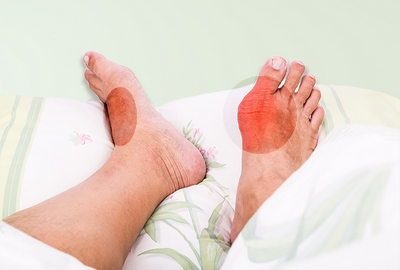
By Alyssa Sybertz and Ann Green
If you often find yourself sidelined by a sudden, throbbing pain in your joints, especially in your big toe, you may be suffering from a gout attack. Flare ups of this common type of arthritis can also cause the affected joint to feel swollen, tender and warm to the touch. Here, we break down what you need to know about gout and how to reduce your risk of developing it. Plus, we share the best 10 minute gout cure — and more easy home remedies — that alleviate pain fast.
What is gout?
Gout is the most common form of inflammatory arthritis and occurs when inflammation in a joint causes symptoms like redness, tenderness and swelling. “Gout is caused by an excess of uric acid in the body, which deposits in joints and causes intermittent episodes of inflammatory arthritis,” explains Theodore R. Fields, MD, a gout specialist and attending rheumatologist at the Hospital for Special Surgery in New York, NY.
Housing for Older Adults
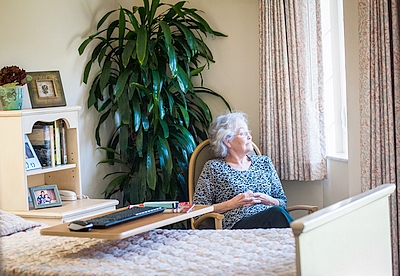
By Mia Chapman
Race & Equity
By 2030, one-fifth of the American population will be aged 65 or over, which will only make worse a critical deficit in suitable housing that caters to their specific requirements. As individuals grow older, their housing needs change, including increased accommodations for those with disabilities. For many older adults, coping with a chronic illness throughout their aging journey will make it difficult to access adequate housing. Across the country, 78% of individuals aged 55 and above grapple with chronic conditions, and 85% among those aged 65 and older. As the age and health of the country shifts, there are also transformations in family systems and dynamics. Increasingly, North Americans are less likely to reside with extended family or even live within an hour of family members who offer intermittent care. While the physical closeness to adult children can serve as a vital support system for many older adults, 15.2 million older adults do not have children, and 22% of adults are currently or will eventually be alone during their elderly years. Generally, Americans are having fewer kids, have longer lifespans, and live alone.
Housing Solutions for Older Adults
As the population ages, there are a variety of cultural and programmatic solutions that address the housing needs of older adults. From cultivating a sense of community to improving physical health, different housing solutions can reap benefits for our aging population.



NEXT EDITION
FRIDAY APRIL 12, 2024

©2024 Bruce Cooper

-30-
*************

















































































